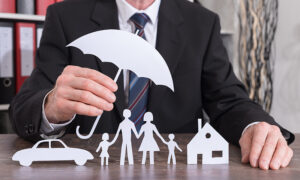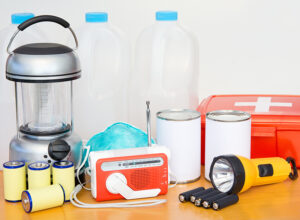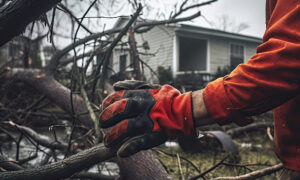Preparing a comprehensive hurricane checklist can help landlords keep their tenants and properties safe. It’s always good to be alert, especially during hurricane season. Staying prepared can help mitigate risk and damage. It’s crucial for properties in at-risk areas.
Hurricane Checklist: How to Prepare for a Hurricane
How can a landlord prepare their properties and tenants for a hurricane? Here’s an ultimate hurricane checklist so you don’t miss anything.
1. Talk to the Tenants
Preparing for a hurricane starts with communicating with the tenants. Check in with the tenants early in the season, especially if they’re new. Remind them that hurricane season can be dangerous and what might happen. Fill them in on some essential hurricane safety tips so they know what to do if a hurricane comes.
For example, remind the tenants that water, power, and utilities may be cut off or impacted during the storm. They should also stay indoors and stock up on food and other supplies that can last for a few days. The tenants should make their hurricane food supply list or any other shopping list for hurricane preparedness. Landlords can also direct them to the National Hurricane Center’s guidelines so they can be ready.
Moreover, landlords should tell them all the tasks they will do to prepare the property for the season. Landlords can also prepare a list of things tenants can do to protect themselves and the property. If possible, landlords should include these responsibilities in the rental agreement. This allows tenants to know what they should do before and during a hurricane before they move in.
2. Insurance
 Make sure the rental property is adequately insured. It’s not enough to have standard rental property insurance either, as hurricane damage is often excluded from coverage. If your current policy doesn’t cover hurricane damage, consider getting an add-on or purchasing separate insurance for the event.
Make sure the rental property is adequately insured. It’s not enough to have standard rental property insurance either, as hurricane damage is often excluded from coverage. If your current policy doesn’t cover hurricane damage, consider getting an add-on or purchasing separate insurance for the event.
In addition, it might be helpful to obtain a policy that covers flooding. Hurricane policies often don’t cover flood damage in their standard policies. Remember to read the fine print and speak with the insurance agency beforehand to keep rental maintenance costs at a minimum.
3. Property Inspection and Maintenance
The next step is to inspect the property and identify any possible vulnerabilities like damaged roofing, weak trees, leaks, and blocked gutters. Make sure to conduct regular maintenance activities and repair what needs repairing so the property and its residents are safe. In addition, it might help to prune trees and clean up debris to limit potential damage.
4. Property Preparation
One of the most important things in this hurricane preparedness checklist is property preparation. Make sure to prepare the property so it can brace for the impact of any hurricanes. Here are some things landlords can do to prepare their rental properties:
- Remove window airconditioning units
- Secure or store outside fixtures like potted plants, patio furniture, and grills
- Install hurricane shutters and storm panels over the doors, vents, windows, and skylights
- Turn off propane tanks and the main gas valve before a scheduled storm
- Tape exposed glass to prevent shattering
- Close outdoor electrical outlets and shield them using duct tape
- Insert wedges in sliding doors
- Lower TV and radio antennas to prevent damage to satellite dishes
- Cover furniture and appliances with plastic wraps and elevate them
- Turn off the electricity powering the swimming pool filter and add chlorine
- Fill any swimming pools only 12 inches below the rim
- Secure porch and garage doors
- Install hurricane straps or roof clips to keep the roof attached if needed
- Place sandbags around the unit and in front of doors to reduce the risk of flooding, if needed
5. Evacuation Plan
Landlords should have an evacuation plan in place so that tenants know what to do if they need to evacuate their homes. Identify evacuation routes and inform them of any shelter locations they can use in case of emergency. Make sure to communicate these instructions to the tenants and any guests or staff.
 6. Provide Hurricane Supplies
6. Provide Hurricane Supplies
Landlords should provide emergency supplies to the tenants. They should have a Hurricane First Aid Kit list that includes bandaids, bandages, medicine, and other supplies. Moreover, landlords should provide tenants with emergency flashlights, batteries, and, if possible, emergency food and water.
These can prove vital to the tenants’ survival during a hurricane. Furthermore, remember to check these supplies and replenish them regularly. Make sure everything is in good working condition, sufficient, and not expired.
7. Create a Communication Plan
Part of a landlord’s hurricane prep list should be a communication plan with the tenants, staff, and guests. This will allow all parties to communicate in case a storm hits. Make sure to gather important information, like the tenants’ contact details. Landlords should also provide tenants with their updated information so they can stay in touch.
It’s important to make a communication strategy all parties can use before, during, and after the storm. During the hurricane, there may be no internet, power, or utilities. This can hinder some communication channels like landlines and social media. However, there may be some leeway for calls and texts. If the residential property includes staff, consider appointing an emergency contact person tenants can reach out to. It’s also important to establish a protocol for the staff or tenants to follow in case of a hurricane.
8. Record Preparation
Finally, landlords should include records preparation in their hurricane preparedness list. Remember to keep a hard and soft copy of all important files, including lease agreements, property titles and deeds, tenant documentation, and insurance records. Consider keeping all of these files in the cloud for safekeeping. Make sure they’re readily accessible if necessary.
Post-Hurricane Checklist
After the hurricane, there are several things landlords left for landlords to do. Here are some things to keep in mind.
1. Communication
Landlords should communicate with tenants after the fact. Reach out to them through the established channels and make sure they’re safe. Provide updates through email, social media, signages, and other means. Be ready to assist and support the tenants to help them recover.
2. Damage Assessment
Hurricanes often damage properties in many ways. Make sure to conduct a proper inspection to assess the damages to the interior and exterior parts of the property. Identify any safety hazards and address those that need immediate attention. It’s also essential to uncover any structural damages and water intrusion to keep the property structurally sound. In addition, landlords should assess outdoor amenities and landscaping.
 3. Repairs and Cleanup
3. Repairs and Cleanup
Landlords should address the damages by issuing work orders to vendors to clean and repair the property. Make sure to prioritize the most critical parts of the home first, such as the property’s foundation. It’s also crucial to fix parts that are essential to survival, such as the kitchen, restroom, and bedrooms.
Communicate with the tenants and let them know when the scheduled repairs and maintenance activities will finish. Provide them with regular updates so they can plan ahead.
Better Safe Than Sorry
Having a comprehensive hurricane checklist is an important part of protecting rental property. After all, hurricanes are not preventable. The best landlords can do to mitigate damages and reduce costs is to prepare for them beforehand. Make sure to review these lists to protect your tenants and your property.
Are you having trouble preparing your tenants and rental property for hurricane season? If so, it may be wise to seek professional help. Find a reliable property management company by looking through our online directory today!
RELATED ARTICLES: